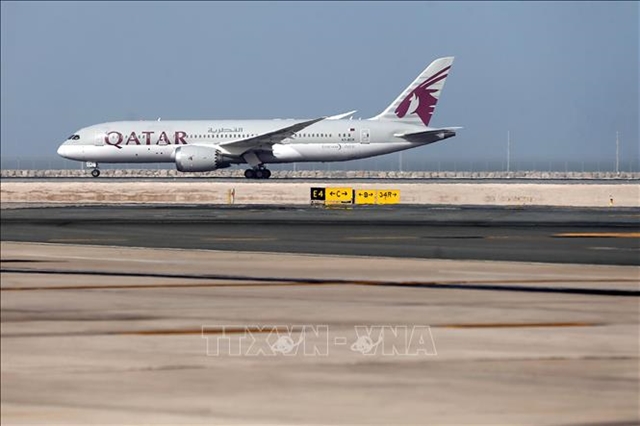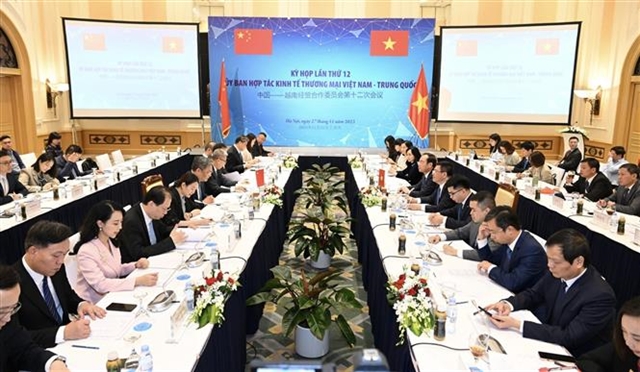 Economy
Economy

 |
| Delegates attended the 12th meeting of the Việt Nam-China Economic and Trade Cooperation Committee which took place in Hà Nội on Monday. — VNA/VNS Photo Trần Việt |
HÀ NỘI — Minister of Industry and Trade Nguyễn Hồng Diên urges China to open its market for more Vietnamese agricultural products, including lobster, and provide support to Vietnamese businesses building trademarks in China.
Diên was speaking at the 12th meeting of the Việt Nam-China Economic and Trade Cooperation Committee which took place in Hà Nội on Monday.
Diễn suggested the Chinese side support Vietnamese businesses in building trademarks in China, and open its market for more Vietnamese agricultural products, urging the signing of a framework agreement on rice trade between the two nations.
The minister called on Chinese authorities to set a transition period for spiny lobsters imported into China, and expand the list of border gates between China and Việt Nam that are allowed to import agricultural and aquatic products, and food.
Diên also mentioned Việt Nam’s plan to complete procedures to establish a trade promotion office in Haikou, Hainan, China in 2023; and strengthen economic and trade cooperation and work coordination between two sides.
He urged the Chinese side to effectively implement signed agreements and support Vietnamese businesses to increase their presence, rent warehouses and export goods through China's e-commerce pilot zones or free trade pilot zones.
For his part, Chinese Commerce Minister Wang Wentao stressed that the Chinese market has great demand and welcomes high-quality agricultural products from Việt Nam.
The Chinese Ministry of Commerce will continue to coordinate and push Chinese Customs to open the market for Vietnamese agricultural products, he affirmed.
Regarding problems in exporting spiny lobsters, Wang said that Vietnamese businesses need to urgently register production and packaging facilities with Chinese Customs, while authorities of the two countries need to soon carry out inspection and assessment of businesses and cultivating areas either in direct or online form so that spiny lobsters of Việt Nam can be exported to China.
On Việt Nam’s proposal to coordinate customs activities to avoid the recurrence of goods congestion at border gates, Wang said that the Chinese Ministry of Commerce attaches great importance to and is ready to coordinate in implementing measures to facilitate customs clearance, thus ensuring the interests of Vietnamese farmers.
The Chinese side will provide a favourable business environment and create conditions for Vietnamese businesses to build a foothold in the Chinese market, he said, expressing joy that Việt Nam has built national pavilions on some major e-commerce platforms of China.
Economic and trade relations among Vietnamese and Chinese localities play an important role in promoting economic and trade cooperation between the two countries, Minister Wang affirmed, adding that the Chinese side highly values efforts by the Vietnamese Ministry of Industry and Trade (MoIT) to build cooperation mechanisms with Guangxi and Yunnan provinces of China.
The Chinese ministry will support the Vietnamese ministry in establishing cooperative relationships with Chinese localities with economic strengths, and expanding relations between the two sides’ localities.
China supports Việt Nam in setting up its trade promotion offices in China, he said, suggesting the Vietnamese side enhance exchange and reach agreements with authorities of localities where it plans to place offices.
He urged the two sides to discuss and push their ministries of Foreign Affairs to speed up related procedures to establish a trade promotion office of Việt Nam in Haikou.
Responding to the Chinese side's proposal, Diên stressed that the MoIT is willing to help relevant sectors and localities of Việt Nam coordinate in opening/upgrading border gates and building smart border gates in Lạng Sơn. He expressed hope that China would coordinate and share experiences in trade defence and e-commerce.
Regarding investment, the Vietnamese side proposed China continue to implement projects using the Mekong - Lancang Cooperation Special Fund.
Meanwhile, the Chinese side also shared the hope to promote digital economic cooperation and green development, industrial cooperation, and improve business and investment environment with Việt Nam.
On this occasion, the two sides also discussed issues related to cooperation, and negotiations to join, upgrade and implement commitments within multilateral frameworks.
They reached significant consensus to promote economic and trade cooperation between Việt Nam and China in the new period and agreed on a plan to organise the 13th meeting in China.
Before the meeting, the two ministers affirmed their determination to coordinate closely and make more efforts to effectively implement the common perceptions reached recently by the two countries' senior leaders on expanding bilateral economic and trade ties.
China has been Việt Nam's largest trading partner and goods supplier, and the second biggest export market of the Southeast Asian nation, for many years.
Notably, Việt Nam became the fourth biggest trade partner of China in the world in 2022, and also China's largest in ASEAN.
Vietnam Customs’ statistics showed that the bilateral trade between Việt Nam and China reached US$175.56 billion in 2022, a rise of 5.47 per cent against 2021. The export value to China was estimated at $50 billion in the first ten months of this year, an increase of 5.1 per cent. — VNS




